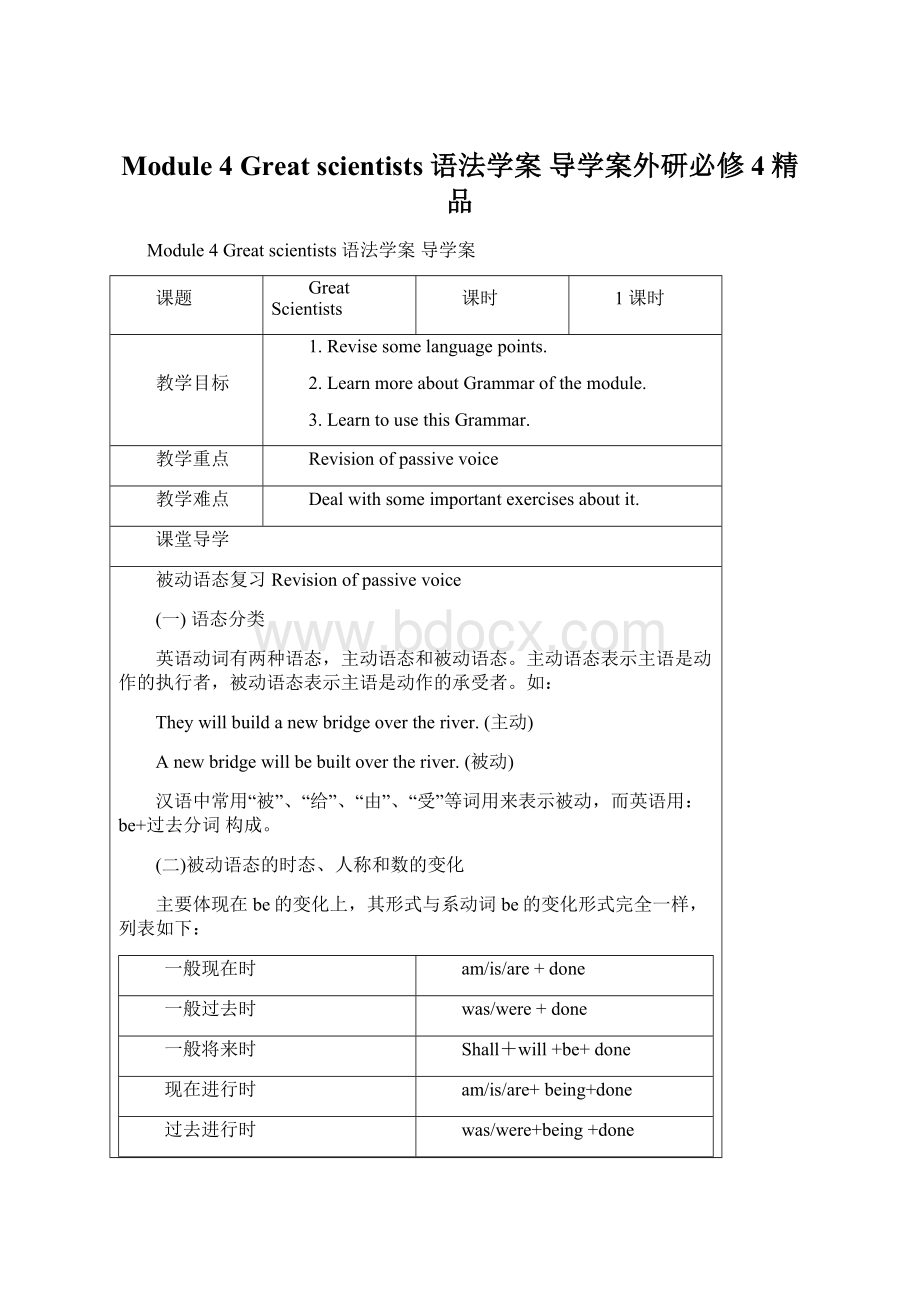 Module 4 Great scientists 语法学案 导学案外研必修4精品Word格式文档下载.docx
Module 4 Great scientists 语法学案 导学案外研必修4精品Word格式文档下载.docx
- 文档编号:19643961
- 上传时间:2023-01-08
- 格式:DOCX
- 页数:12
- 大小:22.75KB
Module 4 Great scientists 语法学案 导学案外研必修4精品Word格式文档下载.docx
《Module 4 Great scientists 语法学案 导学案外研必修4精品Word格式文档下载.docx》由会员分享,可在线阅读,更多相关《Module 4 Great scientists 语法学案 导学案外研必修4精品Word格式文档下载.docx(12页珍藏版)》请在冰豆网上搜索。

(二)被动语态的时态、人称和数的变化
主要体现在be的变化上,其形式与系动词be的变化形式完全一样,列表如下:
一般现在时
am/is/are+done
一般过去时
was/were+done
一般将来时
Shall+will+be+done
现在进行时
am/is/are+being+done
过去进行时
was/were+being+done
过去将来时
Should/would+be+done
现在完成时
Has/have+been+done
过去完成时
Had+been+
done
[注]被动语态没有将来进行时和过去将来进行时。
(三)被动语态常用的八种时态
1.一般现在时
Peoplegrowriceinthesouthofthestates.
_______________________________________________________(改为被动)
Theschooldoesn'
tallowustoenterthechemistrylabwithoutateacher.
We__________________enterthechemistrylabwithoutateacher.(被动)
2.一般过去时
Hehadastrangewayofmakinghisclasseslivelyandinteresting.
Andthestudentsdidn'
tforgethislessonseasily.
Hehadastrangewayofmakinghisclasseslivelyandhislessons______________________.
3.一般将来时
Theywillsendcarsabroadbysea.
Cars___________abroadbysea.
Theywillgiveplentyofjobstoschool-leavers.
Plentyofjobs_________________school-leavers.
4.过去将来时
Themanagersaidtheywouldcompletetheprojectbytheendoftheyear.
Themanagersaidtheproject______________________________________________
5.现在进行时
TheradioisbroadcastingEnglishlessons.
Englishlessons________________________________________________________
6.过去进行时
Thistimelastyearwewereplantingtreeshere.
Trees____________________________________________________
7.现在完成时
Someonehastoldmethesportsmeetmightbeputoff.
I__________________thesportsmeetmightbeputoff.
8.过去完成时
Peoplehadconsideredhimtobeagreatleader.
He_______________________________________________
9.含有情态动词的被动语态
含有情态动词的被动语态是由“情态动词+be+及物动词的过去分词”构成。
e.g.Theteachersaid,“Youmusthandinyourcompositionsafterclass.”
Theteachersaid,“Yourcompositionsmustbehandedinafterclass.”
Hecanwriteagreatmanyletterswiththecomputer.
Agreatmanyletters___________________________________________
(四)被动语态的使用
1.当不知道或没有必要指出动作的执行者时,常用被动语态,这时往往不用by短语。
“Mr.White,thecupwithmixturewasbrokenafterclass.”(只是告诉老师杯子坏了,不知是谁弄坏的,或不想说出谁弄坏的)。
2.突出或强调动作的承受者,如果需要说出动作的执行者,用by短语。
TheserecordsweremadebyJohnDenver.
ThecupwasbrokenbyPaul.
3.当汉语句子的主语既不是动作的执行者,也不是动作的承受者时,这时常用in+名词作状语,而代替by短语。
ThesecarsweremadeinChina.
15,000carswillbeproducedeachyearinthenewfactory.
英译汉:
______________________________________________________________
(五)主动语态变被动语态的方法
1.把主动语态的宾语变成被动语态的主语。
2.把主动语态的谓语变成被动语态的be+过去分词,时态要与原句保持一致。
3.把主动语态的主语变为介词by的宾语,放在被动语态里谓语动词之后,by短语可以省略。
如果原句主语是地点名词,在被动语态中用in+地点名词作状语。
Myauntinvitedmetoherdinnerparty.
主语谓语宾语
Iwasinvited(bymyaunt)toherdinnerparty.
Theschoolsetupaspecialclasstohelppoorreaders.
Aspecialclasstohelppoorreaderswassetupintheschool.
(六)语态转换时所注意的问题
1.把主动语态变为被动语态时,其谓语动词的时态要与原句时态保持一致,其谓语动词的数要与新主语保持一致。
Wehaveboughtanewcomputer.
Anewcomputerhasbeenbought.(正确)
Anewcomputerhavebeenbought.(错误)
2.含有双宾语的主动句变被动句时,可分别将其中的一个宾语变为主语,另一个不动,一般变间接宾语为主语时比较多。
Myunclegavemeapresentonmybirthday.
Iwasgivenapresentonmybirthday.
如果把直接宾语(指物)改为主语,则在间接宾语(指人)前加适当的介词,如上句还可以说:
Apresent_______________________________________
注意:
一般在下列动词后,常在间接宾语前用介词to,如:
bring,give,hand,lend,offer,pass,pay,promise,sell,show,take,teach,tell等。
Themagazinewaspassedontome._____________________________________
Thecupwithmixture________________(show)theclass._____________________________
一般在下列动词后,间接宾语前用介词for,如:
build,buy,cook,cut,choose,do,fetch,find,fix,get,keep,make,order,paint,play,sing等。
Mothermademeanewskirt.__________________________________
有些既不用to也不用for,根据动词与介词的搭配关系。
PeopleallovertheworldknowtheGreatWall.
TheGreatWallisknowntopeopleallovertheworld.(不用by短语)
3.由动词+介词或副词构成的短语动词,要把它们作为整体看,即把它们看成一个及物动词,介词或副词不可拆开或漏掉。
这类动词有:
不及物动词+介词,如:
agreeto,askfor,laughat,operatedon,listento,lookafter,thinkof,talkabout等。
Thepatientisbeingoperatedon._______________________________________
Theproblemissolved.Itneedn'
tbetalkedabout.____________________________________
及物动词+副词:
bringabout,carryout,findout,giveup,handin,makeout,passon,pointout,putaway,putoff,thinkover,turndown,workout,turnout等。
他的请求被拒绝了。
____________________________________
Thesportsmeetwillbeputoffbecauseofthebadweather._____________________________
4.带复合宾语(宾语+宾补)的动词改为被动语态时,一般把主动结构中的宾语改为主语,而宾语补足语保留在谓语动词后面。
Wealwayskeeptheclassroomclean.
Theclassroomisalwayskeptclean.
在see,watch,hear,notice,listento,lookat,make,feel等动词后作宾语补足语的动词不定式都不带to,但改成被动语态后都带to,这时不定式为主语补足语,也就是说不定式作主语补足语不存在省略to的问题。
Weoftenhearhimplaytheguitar.
Heisoftenheardtoplaytheguitar.
带有复合宾语的句子,如果宾语补足语是名词,变被动句时,应将宾语变为主语,不要误把宾语补足语的名词作主语。
TomatoeswerefirsttakenbacktoEuropeandpeoplecalledthemloveapples.
______________________________________________________________________________
误:
Loveappleswerecalledthem.
正:
Theywerecalledloveapples.
5.还有一种短语动词由动词+名词+介词构成,变被动语态有两种形式,如下:
1)Wetakegoodcareofthebooks.
Thebooksaretakengoodcareof.
Goodcareistakenofthebook.
2)Youmustpayattentiontoyourpronunciation.
Attentionmust___________________________________
Yourpronunciation________________________________
用于这类结构的短语动词常见的有:
catchsightof,makeuseof,payattentionto,setfireto,takecareof,takeholdof,takenoticeof,keepaneyeon等。
6.当主动句的主语是nobody,noone等含有否定意义的不定代词时,被动句中将其变为anybody,作by的宾语,并将谓语动词变为否定的被动语态。
Nobodycananswerthisquestion.
Thequestioncanbeansweredbynobody.
Thequestioncannotbeansweredbyanybody.
7.当否定句中的宾语是anything,anybody,anyone等不定代词时,在被动句中应将其分别变为nothing,nobody,noone作主语,并将谓语动词变为肯定的被动语态。
Theyhaven'
tdoneanythingtomaketheriverclean.___________________________________-
误:
Anythinghasn'
tbeendonetomaketheriverclean.
正:
Nothinghasbeendonetomaketheriverclean.
8.以who为主语开头的疑问句,变被动时,用bywhom放在句首:
Whowrotethestory?
Whowasthestorywritten?
Bywhomwasthestorywritten?
9.有些动词既是及物又是不及物,当它们和well,badly,easily等副词连用时,表示主语内在品质或性能,是不及物动词,用主动表示被动,这时不用被动语态,常见的有:
write,read,clean,sell,wash,cook等。
Theclothwasheseasily.___________________________
Thenewproductsellswell._________________________________
Thepenwritessmoothly._______________________________
对比:
Thebookssellwell.(主动句)
Thebooksweresoldout.(被动句)
Themeatdidn'
tcookwell.(主动句)
Themeatwascookedforalongtimeoverlowheat.(被动句)
10.下列情况主动句不能改为被动句:
第一,感官系动词一般用主动形式表示被动意义如:
feel,look,seem,taste,sound,remain等。
Thefoodtastesdelicious.
Thepopmusicsoundsbeautiful.
第二,谓语是及物动词leave,enter,reach,suit,have,benefit,lack,own等。
Heenteredtheroomandgothisbook.
第三,一些不及物动词短语没有被动语态,如:
takeplace,breakout,belongto,loseheart,consistof,addupto等。
Thefirebrokeoutinthecapitalbuilding.
第四,不及物动词没有被动语态,如:
rise,happen,succeed,remain,lie等。
1)Whenwegottothetopofthemountain,thesunhadalreadyrisen.
2)Aftertheearthquake,fewhousesremained.
第五,宾语是反身代词,相互代词,同源宾语,不定式,v-ing形式及抽象名词等,不能变为被动句子的主语,如:
ItaughtmyselfEnglish.
MyselfwastaughtEnglish.
Weloveeachother.
Eachotherisloved.
11.汉语有一类句子不出现主语,在英语中一般可用被动结构表示,如:
据说……Itissaidthat…
据报导……Itisreportedthat…
据推测……Itissupposedthat…
希望……Itishopedthat…
众所周知……Itiswellknownthat…
普遍认为……Itisgenerallyconsideredthat…
有人建议……Itissuggestedthat…
1)Itisreportedthatitisgoingtoraintomorrow.
2)ItiswellknownthatThomasEdisoninventedtheelectriclamp.
高考链接:
1.Thechurchtowerwhichwillbeopentotouristssoon.Theworkisalmostfinished.
A.hasrestoredB.hasbeenrestoredC.isrestoringD.isbeingrestored
2.Thiscoastalareaanationalwildlifereservelastyear.
A.wasnamedB.namedC.isnamedD.names
3.EveryyearafloodoffarmersarriveinShenzhenforthemoney-makingjobstheybeforeleavingtheirhometowns.
A.promisedB.werepromisedC.havepromisedD.havebeenpromised
4.You’vefailedtodowhatyoutoandI’mafraidtheteacherwillblameyou.
A.willexpectB.willbeexpected
C.expectedD.wereexpected
5.InthespokenEnglishofsomeareasintheUS,the“r”soundsattheendofthewords_____________.
AaredroppedBdropCArebeingdroppedDhavedropped
针对训练:
1.Itissaidthatanewrobot____byhiminafewdays.
A.designedB.hasbeendesigned
C.willbedesignedD.willhavebeendesigned
2.Wearelate.Iexpectthefilm____bythetimewegettothecinema.
A.willalreadyhavestartedB.wouldalreadyhavestarted
C.shallhavealreadystartedD.hasalreadybeenstarted
3.Shewillstopshowingoffifnonotice____ofher.
A.istakenB.takes
C.willbetakenD.hastaken
4.Diamond____inBrazilin1971.
A.isfoundB.hasbeenfound
C.wasfoundD.hadbeenfound
5.“Haveyoumovedtothenewflat?
”
“Notyet.Theroom____.”
A.hasbeenpaintedB.ispainted
C.paintsD.isbeingpainted
6.Mypictures____untilnextFriday.
A.won'
tdevelopB.aren'
tdeveloped
C.don'
tdevelopD.won'
tbedeveloped
7.Tim____sincehelosthisjobthr
- 配套讲稿:
如PPT文件的首页显示word图标,表示该PPT已包含配套word讲稿。双击word图标可打开word文档。
- 特殊限制:
部分文档作品中含有的国旗、国徽等图片,仅作为作品整体效果示例展示,禁止商用。设计者仅对作品中独创性部分享有著作权。
- 关 键 词:
- Module Great scientists 语法学案 导学案外研必修4精品 语法学 导学案外研 必修 精品
 冰豆网所有资源均是用户自行上传分享,仅供网友学习交流,未经上传用户书面授权,请勿作他用。
冰豆网所有资源均是用户自行上传分享,仅供网友学习交流,未经上传用户书面授权,请勿作他用。
链接地址:https://www.bdocx.com/doc/19643961.html


 对中国城市家庭的教育投资行为的理论和实证研究.docx
对中国城市家庭的教育投资行为的理论和实证研究.docx
